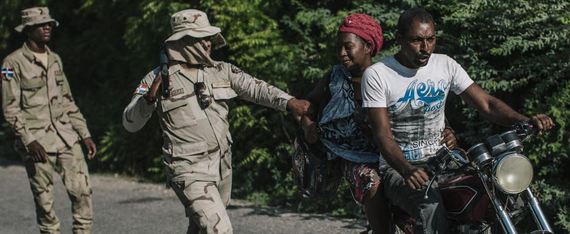Co-authored by Yanilda Gonzalez, a political scientist and organizer with the NY-based activist group We Are All Dominican.
Despite the millions spent by the Dominican government on public relations and lobbying firms, the facts cannot be spun to make the country look as if it's a successful model for documenting migrants and promoting human rights, as José Tomás Pérez, Dominican Ambassador to the United States, claimed in a recent article.
The reality is that the DR fails by every measurement to protect the rights of Dominicans of Haitian descent and respect international norms regarding migrants. The inherent racism in DR's policies force these groups to live with a well-founded fear of being rounded up and forcibly removed to Haiti, often with little more than the clothes on their backs.
In 2013, Dominican Courts retroactively stripped citizenship from Dominicans with any trace of Haitian ancestry going as far back as 1929. This draconian ruling created the largest population of stateless people in the Western Hemisphere. Not Haitian citizens because they had been born in the Dominican Republic and had no Haiti, over 250,000 people suddenly couldn't go to school past the eighth grade, vote, own a home, travel, or get jobs.
Since then, Dominican officials claimed to have fixed a broken system that left both citizens and migrants alike without documentation. Yet, instead of simply reinstating the citizenship of Dominicans of Haitian descent and providing them with government IDs, they created an additional hurdle: a convoluted multi-tier Naturalization Law.
This "naturalization" process nonsensically required Dominicans, born in the DR, to get documents from Haiti and 7 affidavits proving that they were from the DR before being granted two years of residency -- not citizenship -- in their own country. Because the requirements were so restrictive, only a few thousand people made the cut before the deadline, leaving the vast majority of Dominicans of Haitian descent stateless.
Similarly, the plan put forth for undocumented migrants to "come forward without fear of deportation," was implemented in a way reminiscent of voting rights in the Jim Crow South: valid nationality documents were routinely rejected as fakes or confiscated by state officials, the process cost several months' wages, people faced harassment and intimidation at checkpoints along the way, racial profiling was rampant, and too few offices were available to accommodate the amount of people that needed to register.
As a result -- or as intended -- only 2 percent of undocumented migrants were able to complete the registration process to receive residency permits. Rather than extend the deadline to obtain residency permits, the government instead is investing its resources in rounding people up and deporting them.
Let us fact-check the Ambassador's claims:
●Despite the government's assurances that no one born in the Dominican Republic or with legal documents will be deported, several media and human rights organizations have interviewed people whose harrowing experiences contradict that claim: 33% of the people forcibly removed to Haiti were Dominican-born. In one such case, Juan A. Corporán, a construction worker, was picked up by immigration officials and told he was Haitian, even after showing the officers his Dominican ID.
●Because of the Dominican government's refusal to negotiate, no protocols for deportations exist with the Haitian government. Thus, there is no due process as required by international law. Unjust expulsion, family separations, and uprooting routinely occur.
●Just last week, Willy Joseph, a 16-year-old unaccompanied minor, was picked up by immigration officials and taken to a processing center 125 kilometers from his community, a gross violation of the Convention on the Rights of the Child. Even though Willy presented his birth certificate, the officials told him it was not valid and threatened him with expulsion from his own country simply because he "looked Haitian". Willy was released due to pressure from the organization reconoci.do, but many other children have not been so lucky. Police and immigration officials alike are clearly engaging in racial profiling without repercussions, as the experiences of Juan and Willy demonstrate.
●Far from protecting human rights, government officials have been complicit in attacks on migrant communities, including the mob attack in Hatillo Palma where one migrant was killed, and dozens of homes were raided and burned down. Moreover, the Dominican government has routinely targeted those who defend the rights of Dominicans of Haitian descent with intimidation tactics.
●Despite claims made by Ambassador Pérez that there would not be "indiscriminate and collective deportations," we have seen frequent journalists reports of raids in black communities and other spaces leading to mass roundups of people targeted for deportation.
But perhaps the most egregious piece in the Dominican government's propaganda strategy is the oft-repeated claim that Dominican Republic's new citizenship policies adhere to international norms. Ambassador Pérez claims that, "The Dominican Republic's policies are similar to European nations and its neighbors in the Caribbean" in not granting birthright citizenship. Yet, none of these countries have retroactively revoked the citizenship status of hundreds of thousands of people. This makes the Dominican Republic an outlier among "European nations and its neighbors in the Caribbean." Well, except for one.
Here in the United States, we've already seen ugly signs of similar challenges to birthright citizenship, and acts of violence against immigrants inspired by the hateful anti-migrant rhetoric of prominent politicians. The Dominican government's policies should be condemned in any society that respects the rule of law and the dignity of all people, regardless of race, class or ethnicity. They are no model for us to follow, lest we want to generate an even larger humanitarian crisis.

